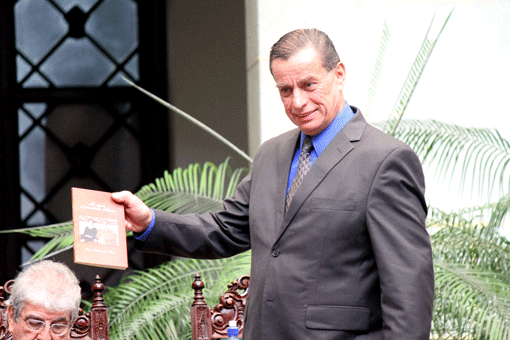On October 20, the day of Guatemala’s revolution, the country’s government formally apologized to the family of former President Juan Jacobo Arbenz Guzmán, who was deposed in a coup in 57 years ago.
“I want to apologize to the family for the great crime committed on June 27, 1954,” said President Alvaro Colom at the National Palace in Guatemala City. “A crime committed against the former president, his wife, his family. It was a historic crime for Guatemala—that day changed Guatemala and we have not recuperated from it since.”
It was a small ceremony held on a national public holiday to celebrate Revolution Day and only a few weeks before the second round of the election this weekend. In attendance were Jacobo Arbenz Vilanova, son of the ex-president, the government’s cabinet, diplomats, national institutions, and, the list of people presented by the family.

Jacobo Arbenz Vilanova, son of the former president, receives the book Mi Esposo el Señor Presidente, a biography written by his mother, María Vilanova. Photo courtesy of Kara Andrade.
“There was no intentionality election-wise or because it’s the end of the government,” said Dora Ruth del Valle Cóbar, president of Centro de Comunicación y Prensa Alternativa para el Desarrollo Humano (COPADEH). “It’s our responsibility and since it’s the first 20th of October that we have after signing the agreement with the victims.”
In 1999, the Arbenz family approached the Inter-American Commission on Human Rights in Washington seeking restoration of their name and reparations for property lost following the coup. The complaint was upheld by the Commission in 2006, which led to five years of negotiations with successive Guatemalan governments over what damages should be paid.
“We suffered the consequences of an injustice that was done in 1954 when an agency from a powerful country was moved by the interests of a very powerful company called United Fruit Company that was accused by the tribunals in Boston as being monopolistic. That’s how justice began. Now we see today how the United States recognizes its mistakes,” Vilanova said.
Guatemala’s coup began after President Arbenz initiated a land-reform policy that saw agrarian councils distribute uncultivated land to individual families. Started in 1952, the policy was in effect for two years prior to the coup, with 1.5 million acres of land changing hands and 100,000 families benefiting from it.
Landowners were compensated but some deliberately kept the value of their holdings low to avoid paying tax on them. Following the coup, ex-president Arbenz went into exile, living in various countries in Europe and Latin America before settling in Mexico where he died in 1971.
A military junta took Arbenz’s place but was quickly replaced as the country went through six presidents in just over three years. The instability the coup caused is viewed as a pivotal reason behind Guatemala’s chaotic history, culminating in a 36-year civil war that left hundreds of thousands of civilians dead.
Both Colom and Vilanova lauded the achievements of Jacobo Arbenz, known as the “Soldier of the Village,” when he was in power. His major achievements include building the first hydroelectric dam in Jurumarinará, linking up the train with the Atlantic highway, extending the port network on the coasts and the controversial land-reform act that led to his downfall.
“Jacob Arbenz became president to be able to develop the economic means that were keeping Guatemala from its growth and were choking Guatemala from growing,” said Vilanova.
The settlement agreement includes a payment of 30 million quetzals ($3.9 million) for the expropriation of the Arbenz property, the ex-president’s legacy in public school curriculum will be changed and a four-lane highway—built and funded by the Taiwanese government—will be named after the ex-president.
A degree program in human rights will be available for public officials and Indigenous leaders in Arbenz’s name. A museum wing has already been named after him and an exposition of his life is currently on display at the National Museum in Guatemala City.
While it’s not something strange for the Guatemalan government to issue an apology, “the apology is more symbolic than anything else,” said Álvaro Velásquez, professor of social sciences and political analyst at Facultad Latinoamericana de Ciencias Sociales (FLACSO) in Guatemala City. “With a new ex-military government this would not have happened.”
President Colom defended his administration for not impeding justice measures, calling these moments, “the stones to build the new Guatemala, the Guatemala without bias, the Guatemala with less inequality and more social justice.”
Nic Wirtz is a guest blogger to AQ Online. He is a freelance journalist who has lived in Guatemala for the last six years. His work has been featured on the Christian Science Monitor and GlobalPost, and he is editor for the website Vozz. He works in rural communities with NGOs such as Orgánicos La Hojita and Asociación de Tejedoras de Salud de San Juan La Laguna.
Kara Andrade is a contributing blogger to AQ Online. She is a Central American-based freelance photojournalist and multimedia producer whose work has been featured in Agence France-Presse, Associated Press, the Christian Science Monitor, France24, the San Jose Mercury News, Contra Costa Times, and the Oakland Tribune.



